EC4009 - Consumer Rights Act: Analyzing a Goods Contract Case Study
VerifiedAdded on 2023/06/11
|7
|1702
|124
Case Study
AI Summary
This case study examines a scenario where a consumer, Arthur, purchases kitchen cabinets and chairs, and his rights under the Consumer Rights Act 2015 (CRA) are potentially breached. The analysis focuses on sections 9, 10, and 11 of the CRA, addressing satisfactory quality, fitness for purpose, and goods matching the description. The cabinets have minor scratches, doors that don't close properly, and are made of oak instead of the described pine. The chairs, intended to be light for children to move, are heavy. The study concludes that Arthur's consumer rights have been violated, entitling him to reject the goods and claim a refund under sections 19 and 20 of the CRA. Desklib offers a variety of resources, including past papers and solved assignments, to assist students in understanding and applying legal concepts.
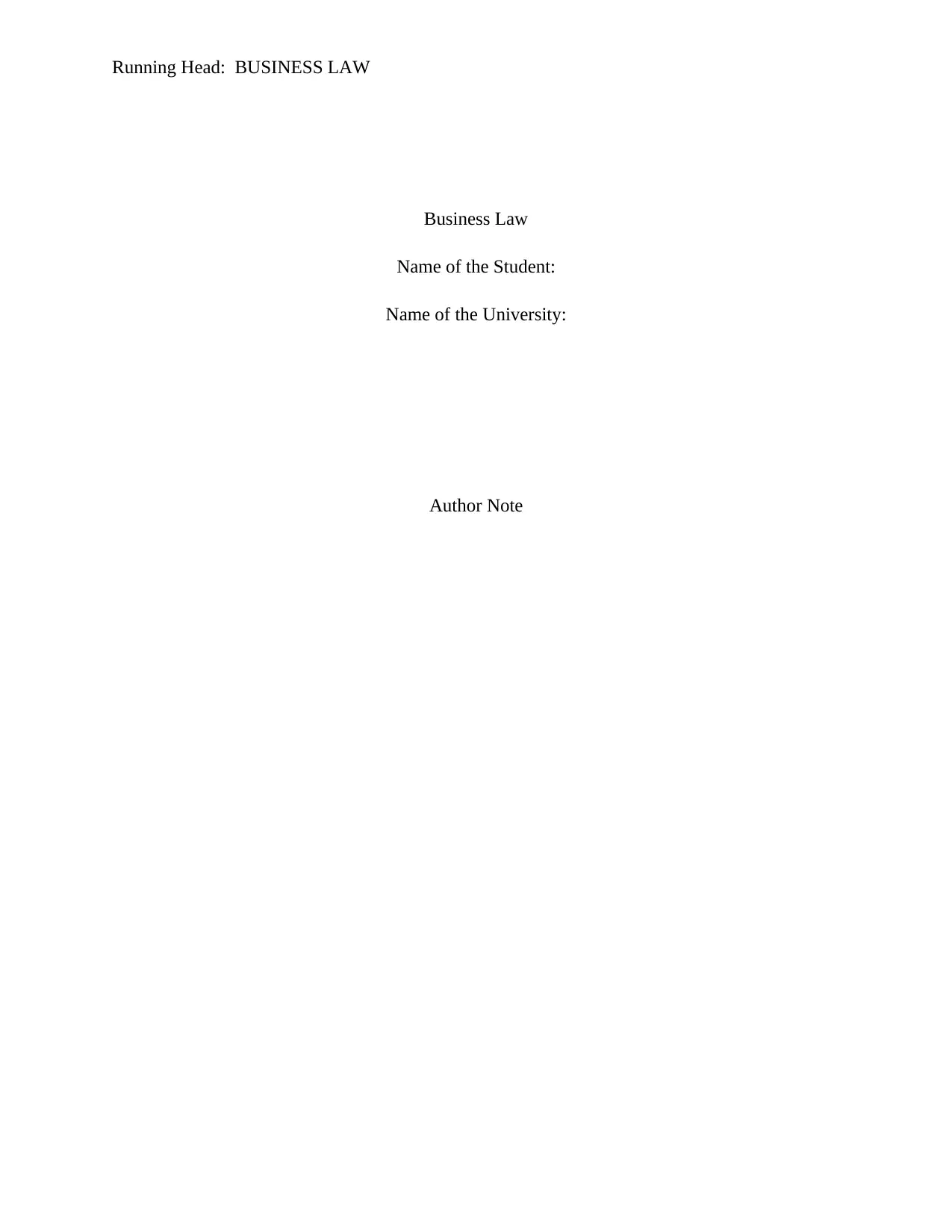
Running Head: BUSINESS LAW
Business Law
Name of the Student:
Name of the University:
Author Note
Business Law
Name of the Student:
Name of the University:
Author Note
Paraphrase This Document
Need a fresh take? Get an instant paraphrase of this document with our AI Paraphraser
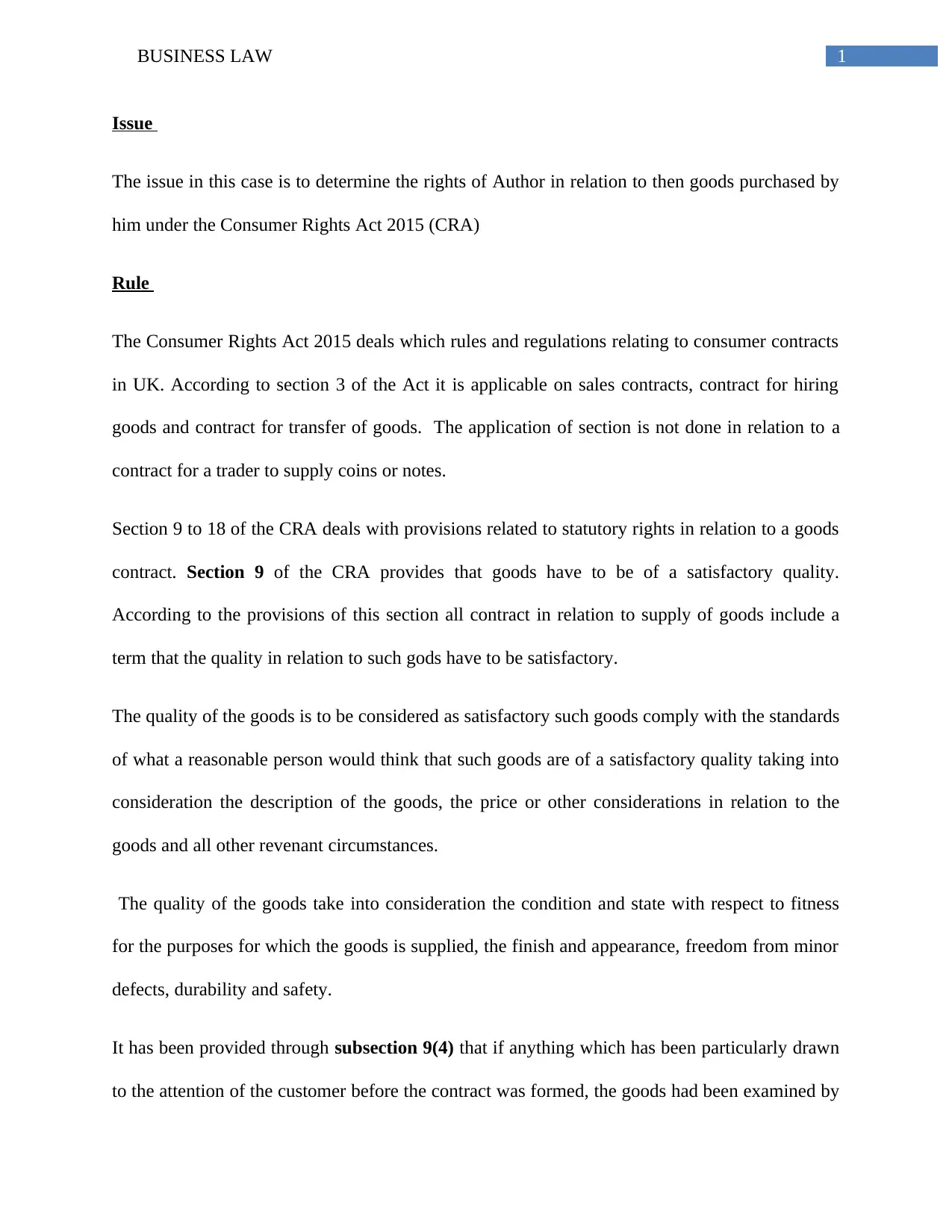
1BUSINESS LAW
Issue
The issue in this case is to determine the rights of Author in relation to then goods purchased by
him under the Consumer Rights Act 2015 (CRA)
Rule
The Consumer Rights Act 2015 deals which rules and regulations relating to consumer contracts
in UK. According to section 3 of the Act it is applicable on sales contracts, contract for hiring
goods and contract for transfer of goods. The application of section is not done in relation to a
contract for a trader to supply coins or notes.
Section 9 to 18 of the CRA deals with provisions related to statutory rights in relation to a goods
contract. Section 9 of the CRA provides that goods have to be of a satisfactory quality.
According to the provisions of this section all contract in relation to supply of goods include a
term that the quality in relation to such gods have to be satisfactory.
The quality of the goods is to be considered as satisfactory such goods comply with the standards
of what a reasonable person would think that such goods are of a satisfactory quality taking into
consideration the description of the goods, the price or other considerations in relation to the
goods and all other revenant circumstances.
The quality of the goods take into consideration the condition and state with respect to fitness
for the purposes for which the goods is supplied, the finish and appearance, freedom from minor
defects, durability and safety.
It has been provided through subsection 9(4) that if anything which has been particularly drawn
to the attention of the customer before the contract was formed, the goods had been examined by
Issue
The issue in this case is to determine the rights of Author in relation to then goods purchased by
him under the Consumer Rights Act 2015 (CRA)
Rule
The Consumer Rights Act 2015 deals which rules and regulations relating to consumer contracts
in UK. According to section 3 of the Act it is applicable on sales contracts, contract for hiring
goods and contract for transfer of goods. The application of section is not done in relation to a
contract for a trader to supply coins or notes.
Section 9 to 18 of the CRA deals with provisions related to statutory rights in relation to a goods
contract. Section 9 of the CRA provides that goods have to be of a satisfactory quality.
According to the provisions of this section all contract in relation to supply of goods include a
term that the quality in relation to such gods have to be satisfactory.
The quality of the goods is to be considered as satisfactory such goods comply with the standards
of what a reasonable person would think that such goods are of a satisfactory quality taking into
consideration the description of the goods, the price or other considerations in relation to the
goods and all other revenant circumstances.
The quality of the goods take into consideration the condition and state with respect to fitness
for the purposes for which the goods is supplied, the finish and appearance, freedom from minor
defects, durability and safety.
It has been provided through subsection 9(4) that if anything which has been particularly drawn
to the attention of the customer before the contract was formed, the goods had been examined by
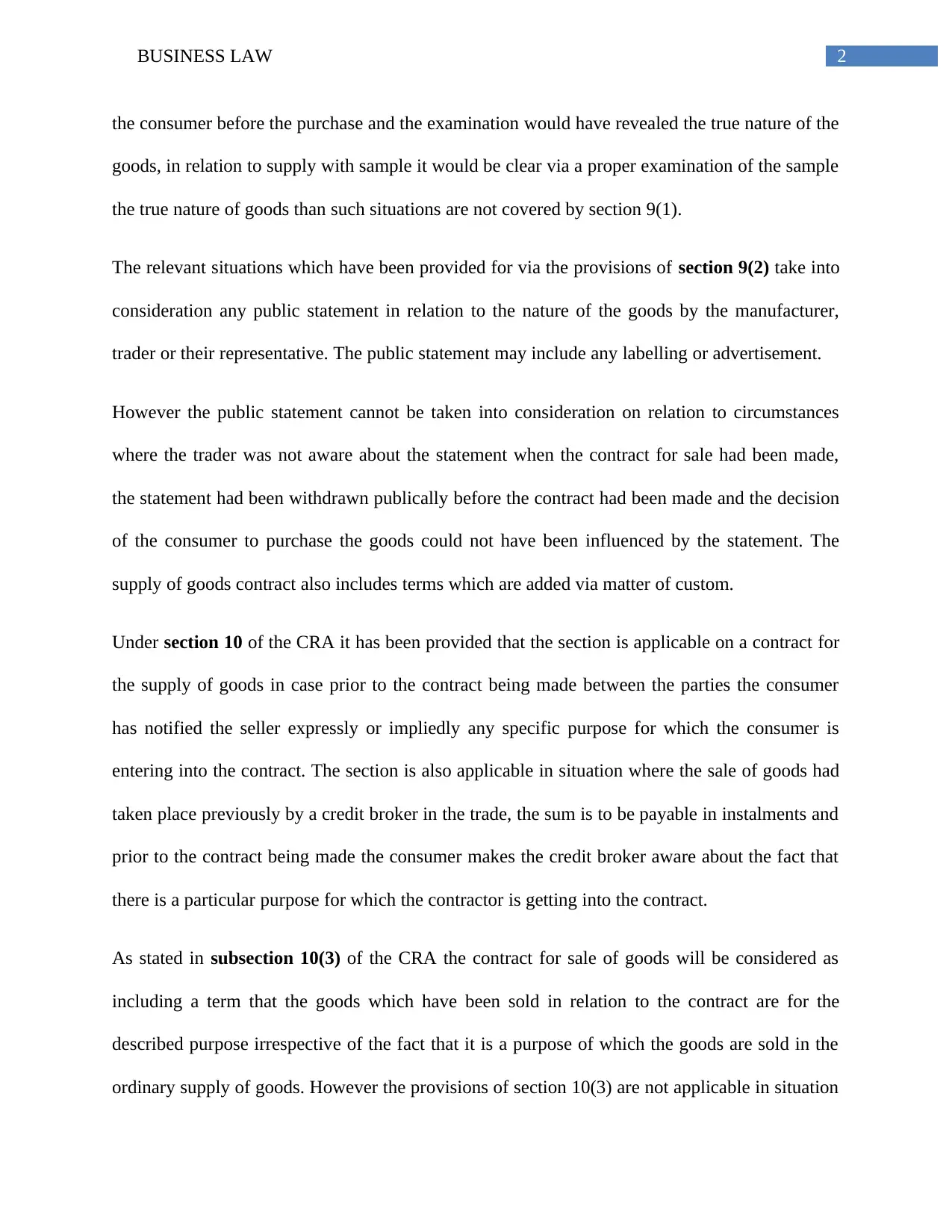
2BUSINESS LAW
the consumer before the purchase and the examination would have revealed the true nature of the
goods, in relation to supply with sample it would be clear via a proper examination of the sample
the true nature of goods than such situations are not covered by section 9(1).
The relevant situations which have been provided for via the provisions of section 9(2) take into
consideration any public statement in relation to the nature of the goods by the manufacturer,
trader or their representative. The public statement may include any labelling or advertisement.
However the public statement cannot be taken into consideration on relation to circumstances
where the trader was not aware about the statement when the contract for sale had been made,
the statement had been withdrawn publically before the contract had been made and the decision
of the consumer to purchase the goods could not have been influenced by the statement. The
supply of goods contract also includes terms which are added via matter of custom.
Under section 10 of the CRA it has been provided that the section is applicable on a contract for
the supply of goods in case prior to the contract being made between the parties the consumer
has notified the seller expressly or impliedly any specific purpose for which the consumer is
entering into the contract. The section is also applicable in situation where the sale of goods had
taken place previously by a credit broker in the trade, the sum is to be payable in instalments and
prior to the contract being made the consumer makes the credit broker aware about the fact that
there is a particular purpose for which the contractor is getting into the contract.
As stated in subsection 10(3) of the CRA the contract for sale of goods will be considered as
including a term that the goods which have been sold in relation to the contract are for the
described purpose irrespective of the fact that it is a purpose of which the goods are sold in the
ordinary supply of goods. However the provisions of section 10(3) are not applicable in situation
the consumer before the purchase and the examination would have revealed the true nature of the
goods, in relation to supply with sample it would be clear via a proper examination of the sample
the true nature of goods than such situations are not covered by section 9(1).
The relevant situations which have been provided for via the provisions of section 9(2) take into
consideration any public statement in relation to the nature of the goods by the manufacturer,
trader or their representative. The public statement may include any labelling or advertisement.
However the public statement cannot be taken into consideration on relation to circumstances
where the trader was not aware about the statement when the contract for sale had been made,
the statement had been withdrawn publically before the contract had been made and the decision
of the consumer to purchase the goods could not have been influenced by the statement. The
supply of goods contract also includes terms which are added via matter of custom.
Under section 10 of the CRA it has been provided that the section is applicable on a contract for
the supply of goods in case prior to the contract being made between the parties the consumer
has notified the seller expressly or impliedly any specific purpose for which the consumer is
entering into the contract. The section is also applicable in situation where the sale of goods had
taken place previously by a credit broker in the trade, the sum is to be payable in instalments and
prior to the contract being made the consumer makes the credit broker aware about the fact that
there is a particular purpose for which the contractor is getting into the contract.
As stated in subsection 10(3) of the CRA the contract for sale of goods will be considered as
including a term that the goods which have been sold in relation to the contract are for the
described purpose irrespective of the fact that it is a purpose of which the goods are sold in the
ordinary supply of goods. However the provisions of section 10(3) are not applicable in situation
⊘ This is a preview!⊘
Do you want full access?
Subscribe today to unlock all pages.

Trusted by 1+ million students worldwide
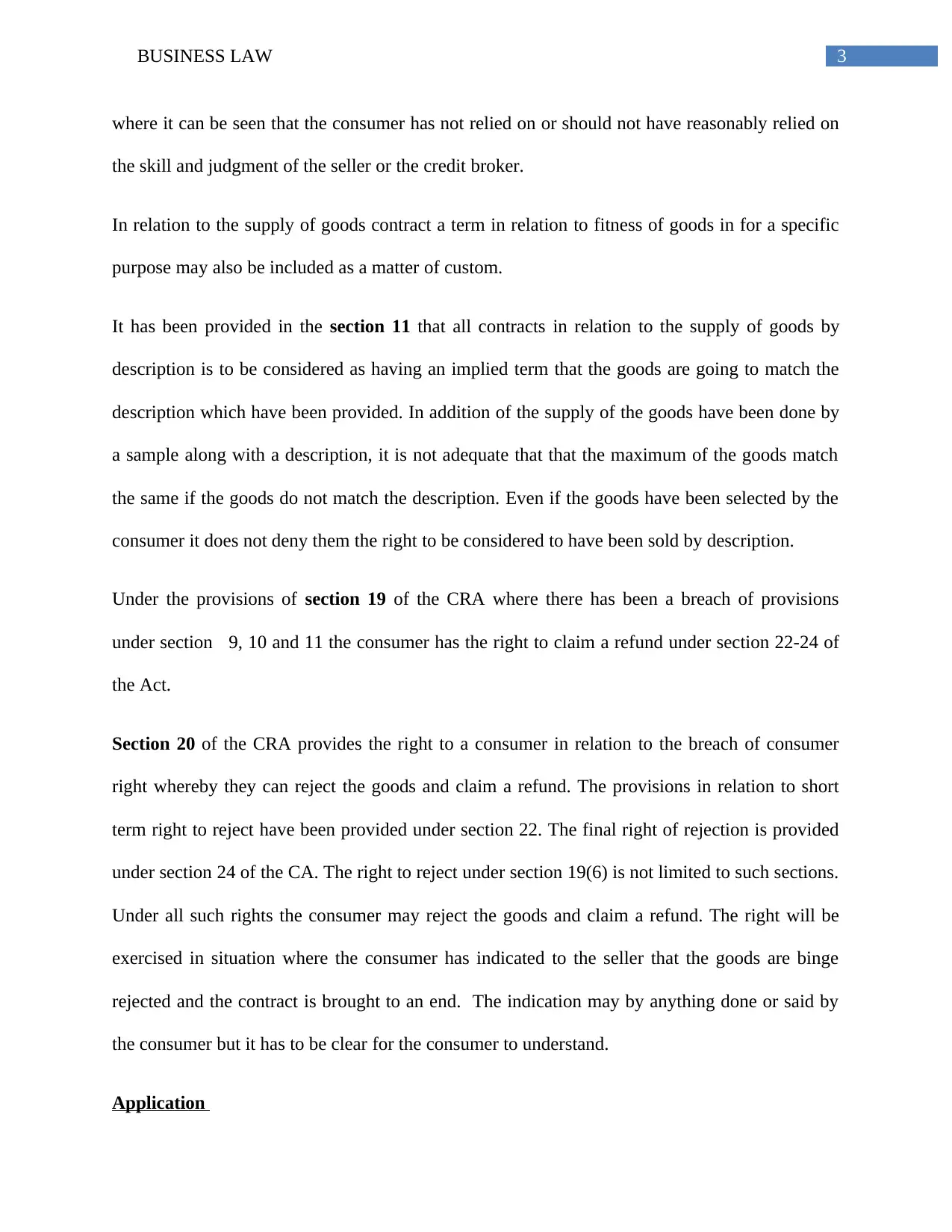
3BUSINESS LAW
where it can be seen that the consumer has not relied on or should not have reasonably relied on
the skill and judgment of the seller or the credit broker.
In relation to the supply of goods contract a term in relation to fitness of goods in for a specific
purpose may also be included as a matter of custom.
It has been provided in the section 11 that all contracts in relation to the supply of goods by
description is to be considered as having an implied term that the goods are going to match the
description which have been provided. In addition of the supply of the goods have been done by
a sample along with a description, it is not adequate that that the maximum of the goods match
the same if the goods do not match the description. Even if the goods have been selected by the
consumer it does not deny them the right to be considered to have been sold by description.
Under the provisions of section 19 of the CRA where there has been a breach of provisions
under section 9, 10 and 11 the consumer has the right to claim a refund under section 22-24 of
the Act.
Section 20 of the CRA provides the right to a consumer in relation to the breach of consumer
right whereby they can reject the goods and claim a refund. The provisions in relation to short
term right to reject have been provided under section 22. The final right of rejection is provided
under section 24 of the CA. The right to reject under section 19(6) is not limited to such sections.
Under all such rights the consumer may reject the goods and claim a refund. The right will be
exercised in situation where the consumer has indicated to the seller that the goods are binge
rejected and the contract is brought to an end. The indication may by anything done or said by
the consumer but it has to be clear for the consumer to understand.
Application
where it can be seen that the consumer has not relied on or should not have reasonably relied on
the skill and judgment of the seller or the credit broker.
In relation to the supply of goods contract a term in relation to fitness of goods in for a specific
purpose may also be included as a matter of custom.
It has been provided in the section 11 that all contracts in relation to the supply of goods by
description is to be considered as having an implied term that the goods are going to match the
description which have been provided. In addition of the supply of the goods have been done by
a sample along with a description, it is not adequate that that the maximum of the goods match
the same if the goods do not match the description. Even if the goods have been selected by the
consumer it does not deny them the right to be considered to have been sold by description.
Under the provisions of section 19 of the CRA where there has been a breach of provisions
under section 9, 10 and 11 the consumer has the right to claim a refund under section 22-24 of
the Act.
Section 20 of the CRA provides the right to a consumer in relation to the breach of consumer
right whereby they can reject the goods and claim a refund. The provisions in relation to short
term right to reject have been provided under section 22. The final right of rejection is provided
under section 24 of the CA. The right to reject under section 19(6) is not limited to such sections.
Under all such rights the consumer may reject the goods and claim a refund. The right will be
exercised in situation where the consumer has indicated to the seller that the goods are binge
rejected and the contract is brought to an end. The indication may by anything done or said by
the consumer but it has to be clear for the consumer to understand.
Application
Paraphrase This Document
Need a fresh take? Get an instant paraphrase of this document with our AI Paraphraser
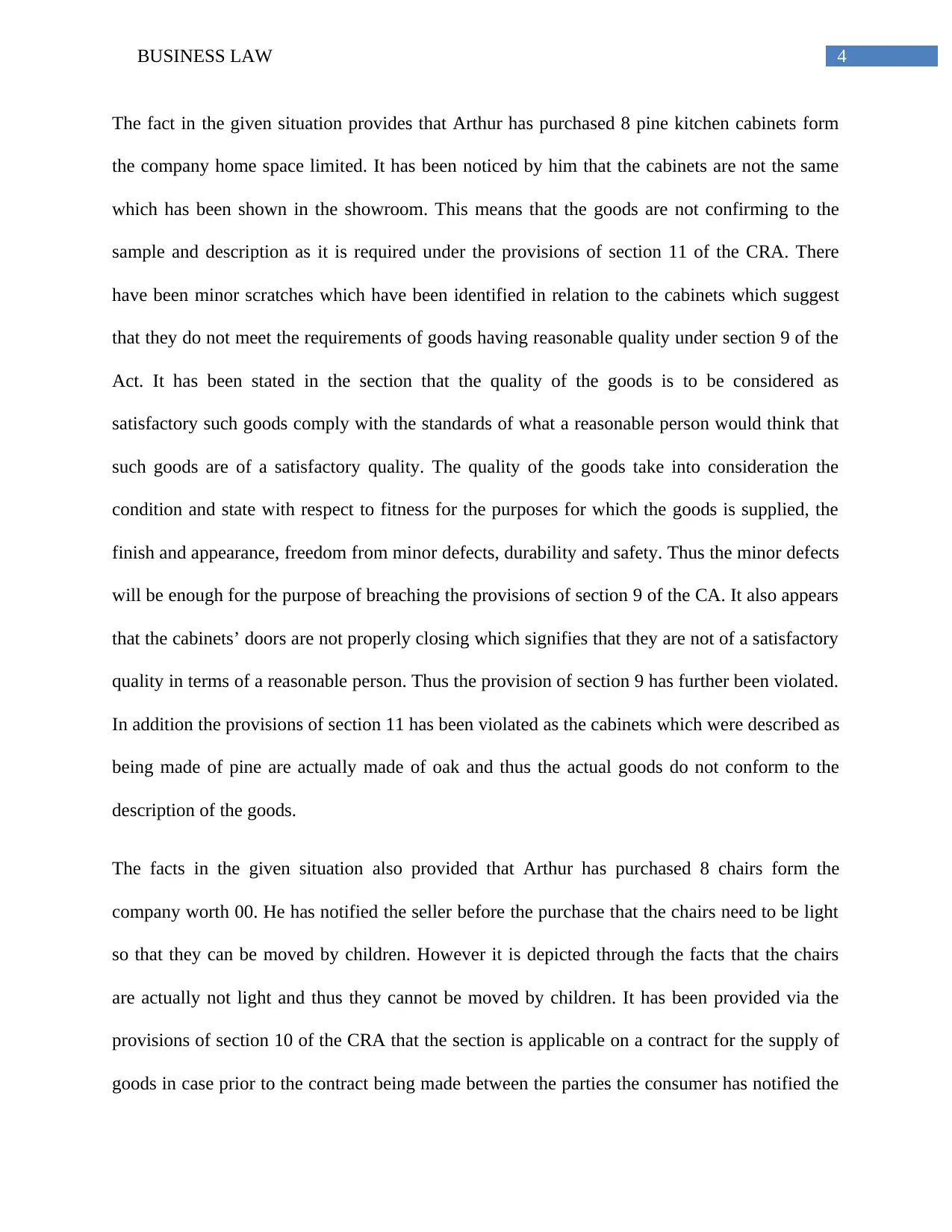
4BUSINESS LAW
The fact in the given situation provides that Arthur has purchased 8 pine kitchen cabinets form
the company home space limited. It has been noticed by him that the cabinets are not the same
which has been shown in the showroom. This means that the goods are not confirming to the
sample and description as it is required under the provisions of section 11 of the CRA. There
have been minor scratches which have been identified in relation to the cabinets which suggest
that they do not meet the requirements of goods having reasonable quality under section 9 of the
Act. It has been stated in the section that the quality of the goods is to be considered as
satisfactory such goods comply with the standards of what a reasonable person would think that
such goods are of a satisfactory quality. The quality of the goods take into consideration the
condition and state with respect to fitness for the purposes for which the goods is supplied, the
finish and appearance, freedom from minor defects, durability and safety. Thus the minor defects
will be enough for the purpose of breaching the provisions of section 9 of the CA. It also appears
that the cabinets’ doors are not properly closing which signifies that they are not of a satisfactory
quality in terms of a reasonable person. Thus the provision of section 9 has further been violated.
In addition the provisions of section 11 has been violated as the cabinets which were described as
being made of pine are actually made of oak and thus the actual goods do not conform to the
description of the goods.
The facts in the given situation also provided that Arthur has purchased 8 chairs form the
company worth 00. He has notified the seller before the purchase that the chairs need to be light
so that they can be moved by children. However it is depicted through the facts that the chairs
are actually not light and thus they cannot be moved by children. It has been provided via the
provisions of section 10 of the CRA that the section is applicable on a contract for the supply of
goods in case prior to the contract being made between the parties the consumer has notified the
The fact in the given situation provides that Arthur has purchased 8 pine kitchen cabinets form
the company home space limited. It has been noticed by him that the cabinets are not the same
which has been shown in the showroom. This means that the goods are not confirming to the
sample and description as it is required under the provisions of section 11 of the CRA. There
have been minor scratches which have been identified in relation to the cabinets which suggest
that they do not meet the requirements of goods having reasonable quality under section 9 of the
Act. It has been stated in the section that the quality of the goods is to be considered as
satisfactory such goods comply with the standards of what a reasonable person would think that
such goods are of a satisfactory quality. The quality of the goods take into consideration the
condition and state with respect to fitness for the purposes for which the goods is supplied, the
finish and appearance, freedom from minor defects, durability and safety. Thus the minor defects
will be enough for the purpose of breaching the provisions of section 9 of the CA. It also appears
that the cabinets’ doors are not properly closing which signifies that they are not of a satisfactory
quality in terms of a reasonable person. Thus the provision of section 9 has further been violated.
In addition the provisions of section 11 has been violated as the cabinets which were described as
being made of pine are actually made of oak and thus the actual goods do not conform to the
description of the goods.
The facts in the given situation also provided that Arthur has purchased 8 chairs form the
company worth 00. He has notified the seller before the purchase that the chairs need to be light
so that they can be moved by children. However it is depicted through the facts that the chairs
are actually not light and thus they cannot be moved by children. It has been provided via the
provisions of section 10 of the CRA that the section is applicable on a contract for the supply of
goods in case prior to the contract being made between the parties the consumer has notified the
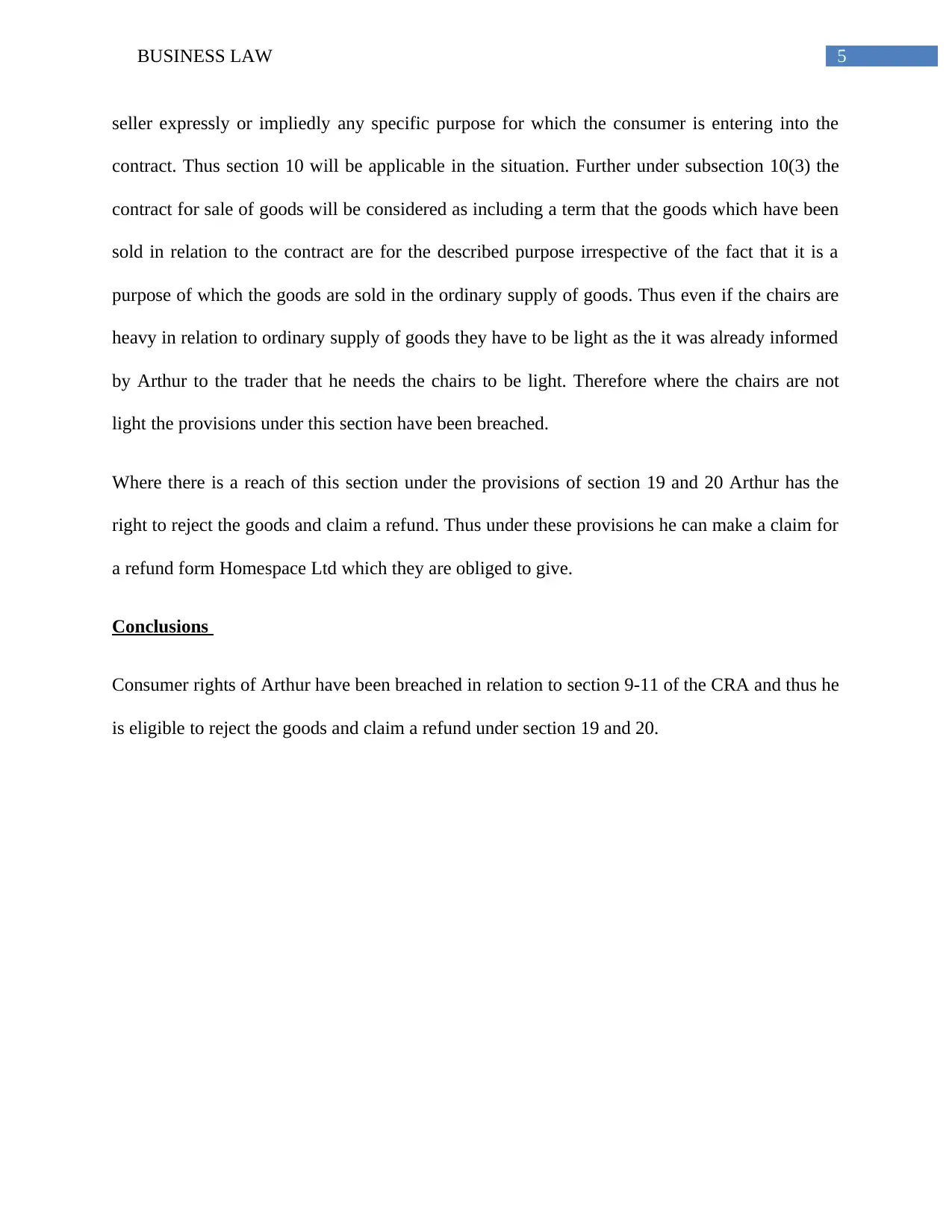
5BUSINESS LAW
seller expressly or impliedly any specific purpose for which the consumer is entering into the
contract. Thus section 10 will be applicable in the situation. Further under subsection 10(3) the
contract for sale of goods will be considered as including a term that the goods which have been
sold in relation to the contract are for the described purpose irrespective of the fact that it is a
purpose of which the goods are sold in the ordinary supply of goods. Thus even if the chairs are
heavy in relation to ordinary supply of goods they have to be light as the it was already informed
by Arthur to the trader that he needs the chairs to be light. Therefore where the chairs are not
light the provisions under this section have been breached.
Where there is a reach of this section under the provisions of section 19 and 20 Arthur has the
right to reject the goods and claim a refund. Thus under these provisions he can make a claim for
a refund form Homespace Ltd which they are obliged to give.
Conclusions
Consumer rights of Arthur have been breached in relation to section 9-11 of the CRA and thus he
is eligible to reject the goods and claim a refund under section 19 and 20.
seller expressly or impliedly any specific purpose for which the consumer is entering into the
contract. Thus section 10 will be applicable in the situation. Further under subsection 10(3) the
contract for sale of goods will be considered as including a term that the goods which have been
sold in relation to the contract are for the described purpose irrespective of the fact that it is a
purpose of which the goods are sold in the ordinary supply of goods. Thus even if the chairs are
heavy in relation to ordinary supply of goods they have to be light as the it was already informed
by Arthur to the trader that he needs the chairs to be light. Therefore where the chairs are not
light the provisions under this section have been breached.
Where there is a reach of this section under the provisions of section 19 and 20 Arthur has the
right to reject the goods and claim a refund. Thus under these provisions he can make a claim for
a refund form Homespace Ltd which they are obliged to give.
Conclusions
Consumer rights of Arthur have been breached in relation to section 9-11 of the CRA and thus he
is eligible to reject the goods and claim a refund under section 19 and 20.
⊘ This is a preview!⊘
Do you want full access?
Subscribe today to unlock all pages.

Trusted by 1+ million students worldwide
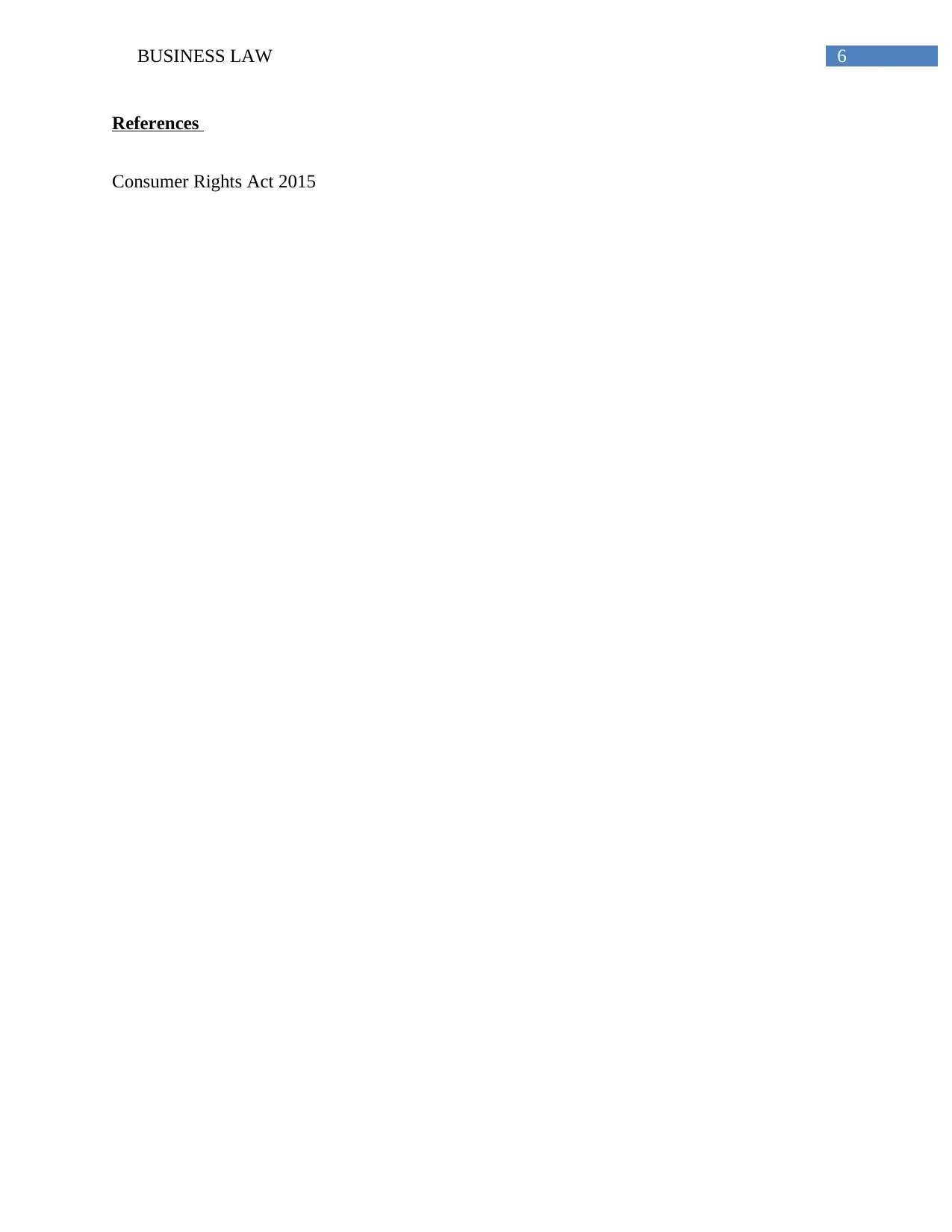
6BUSINESS LAW
References
Consumer Rights Act 2015
References
Consumer Rights Act 2015
1 out of 7
Related Documents
Your All-in-One AI-Powered Toolkit for Academic Success.
+13062052269
info@desklib.com
Available 24*7 on WhatsApp / Email
![[object Object]](/_next/static/media/star-bottom.7253800d.svg)
Unlock your academic potential
Copyright © 2020–2026 A2Z Services. All Rights Reserved. Developed and managed by ZUCOL.





